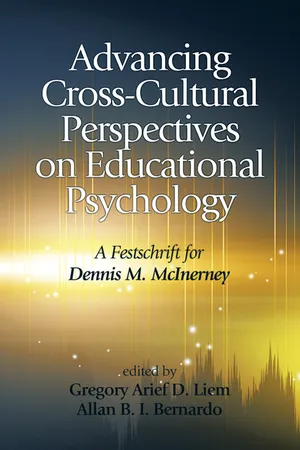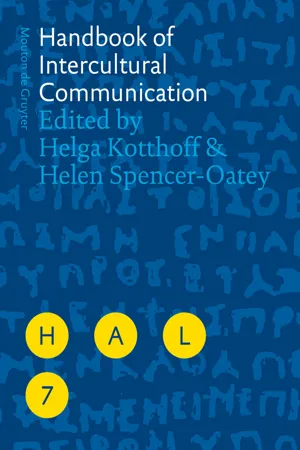Psychology
Sociocultural Perspective in Psychology
The sociocultural perspective in psychology emphasizes the influence of social and cultural factors on an individual's behavior, thoughts, and emotions. It examines how societal norms, cultural values, and social interactions shape an individual's psychological processes and development. This perspective highlights the importance of considering the broader social and cultural context when understanding human behavior and mental processes.
Written by Perlego with AI-assistance
Related key terms
1 of 5
4 Key excerpts on "Sociocultural Perspective in Psychology"
- Gregory Arief D. Liem, Allan B. I. Bernardo(Authors)
- 2015(Publication Date)
- Information Age Publishing(Publisher)
SECTION I PERSPECTIVES ON CULTURE IN EDUCATIONAL PSYCHOLOGY RESEARCH Advancing Cross-Cultural Perspectives on Educational Psychology, pages 21–37 Copyright © 2013 by Information Age Publishing All rights of reproduction in any form reserved. 21 CHAPTER 2 CULTURE AND EDUCATIONAL PSYCHOLOGY Hyisung C. Hwang and David Matsumoto San Francisco State University and Humintell, LLC INTRODUCTION Culture is one of the biggest challenges we face as educators and research- ers because culture is an entity that involves complex social structures, elements and their meanings. Society and individuals are influenced by culture as well as create culture, and culture both enables and hinders be- haviors. The task of understanding cultures has become increasingly more complicated and broad as multicultural individuals and families are found in society now more than ever before. Misunderstandings and miscommu- nications between different cultural groups and individuals can be reduced and resolved if we are aware of cultural variety and understand cultural variations. Within this big picture, culture in educational settings is an interesting and important topic, although it has not been a major topic of discussion in educational psychology. Considering the ever-increasing and changing social 22 H. C. HWANG and D. MATSUMOTO needs in the school context, culture must be researched and understood in depth; it is important to know what culture is and how it influences individu- als, groups, and societies in order to optimize the effects of education. The goal of this chapter is to stimulate thinking about culture by facilitating the understanding of what culture is and how it influences individuals and soci- eties. We will discuss the relationship among culture, mental processes and behaviors especially vis-à-vis educational contexts. Lastly, directions for future research examining culture and education will be proposed.- eBook - PDF
- Helga Kotthoff, Helen Spencer-Oatey, Helga Kotthoff, Helen Spencer-Oatey(Authors)
- 2008(Publication Date)
- De Gruyter Mouton(Publisher)
Psychological perspectives 55 4. Psychological perspectives: social psychology, language, and intercultural communication Madeleine Brabant, Bernadette Watson and Cindy Gallois 1. Introduction Intercultural communication has a long history in social psychology and in many other fields. Indeed, the tradition of language and social psychology (LASP: e.g. Giles and Coupland 1991) emerged from studies of intercultural communication, as social psychologists in the 1960s and 70s aimed to add their own insights to research in linguistics and anthropology. Today, most scholars in language and social psychology consider intercultural encounters to be at the heart of their field (see Gallois, McKay and Pittam 2004). Because the literature from psychology is so large, we can barely scratch its surface in a single chapter, and we have been very selective. Readers wanting more detail might wish to explore the series of volumes on intercultural com-munication published since the early 1980s by Sage, in particular the volumes on theories in intercultural communication (Gudykunst 2005; Kim and Gudykunst 1988; Wiseman 1995), as well as other chapters in this volume. In addition, there are many books (particularly Robinson and Giles 2001) and two major journals ( Journal of Cross-Cultural Psychology and International Jour-nal of Intercultural Relations ) that have a largely psychological approach to intercultural communication. In this chapter, we attempt to describe the major features of the social-psychological perspective which distinguish it from other approaches, along with a critique of this perspective and some suggestions for the future. We examine two major traditions in the study of intercultural communi-cation in social psychology. The first of these traditions, the larger in terms of numbers of scholars and studies, is generally known as ‘intercultural communi-cation competence’ (ICC). - eBook - PDF
- Roland Meighan, Clive Harber(Authors)
- 2007(Publication Date)
- Continuum(Publisher)
Part Four SOCIOLOGICAL PERSPECTIVES AND THE STUDY OF EDUCATION LEN BARTON AND STEPHEN WALKER WHAT IS A PERSPECTIVE? In Chapter 1 the sociologist was likened to a spy, an 'agent' involved in the business of collecting key information on the mechanisms and processes of social life. Much of the material presented so far has been concerned with the reports made by those sociological spies who have investigated the world of education. However, the validity of any spy's report has to be scru-tinized. The spy who infiltrates the organization is likely to depict the scene under investigation in a very different way from one who looks through the keyhole, and so the vaildity of what he or she reports is closely related to the position from which the observations were made. Similarly, no sociologist can approach the study of social life without making some selection from the various perspectives available, and, if the information offered by such sociologists is to be of use to people in their daily lives, it is necessary to know both the perspective from which the sociologist is working and the ways in which this perspective is distinct from other sociological stances. In this section the intention is to introduce the reader to some of the various perspectives used by sociologists in their endeavour to analyse human conduct. Initially, therefore, it is important to understand what we mean by the term 'perspective'. A perspective is a frame of reference, a series of working rules by which a person is able to make sense of complex and puzzling phenomena. For the sociologist the phenomenon is social life and, in adopting a particular stance towards this, he or she makes use of a set of assumptions upon which analysis can be based and which, typically, includes ideas about the following: A Sociology of Educating 1. A view of humankind, i.e. an idea about what distinguishes human beings from other species. - eBook - PDF
- Edward Sapir, Judith T. Irvine(Authors)
- 2011(Publication Date)
- De Gruyter Mouton(Publisher)
Chapter Nine Psychological Aspects of Culture 1. [The Difficulty of Delimiting a Boundary Between Personality and Culture] [If the psychologists' study of personality is deficient because] they persist in studying only fragmentary psychological processes, [omitting the cul-tural dimension,] the same is true in culture. There too we study frag-mentary data. [As I have said,] we [anthropologists] are obtuse about the implications of data [that pertain to] personality. [The trouble is that both psychologists and anthropologists generally draw a sharp line be-tween their disciplines and fail to recognize the overlap, even identity, of the problems they study.] The failure of social science as a whole to relate the patterns of culture to germinal personality patterns is intelligible in view of the complexity of social phenomena and the recency of serious speculation on the relation of the individual to society. But there is growing recognition of the fact that the intimate study of personality is of fundamental concern to the social scientist. 1 [Indeed,] there is no reason why the culturalist should be afraid of the concept of personality, which must not, however, be thought of, as one inevitably does at the beginning of his thinking, as a mysterious entity resisting the historically given culture but rather as a distinctive configuration of experience which tends always to form a psychologically significant unit.
Index pages curate the most relevant extracts from our library of academic textbooks. They’ve been created using an in-house natural language model (NLM), each adding context and meaning to key research topics.



